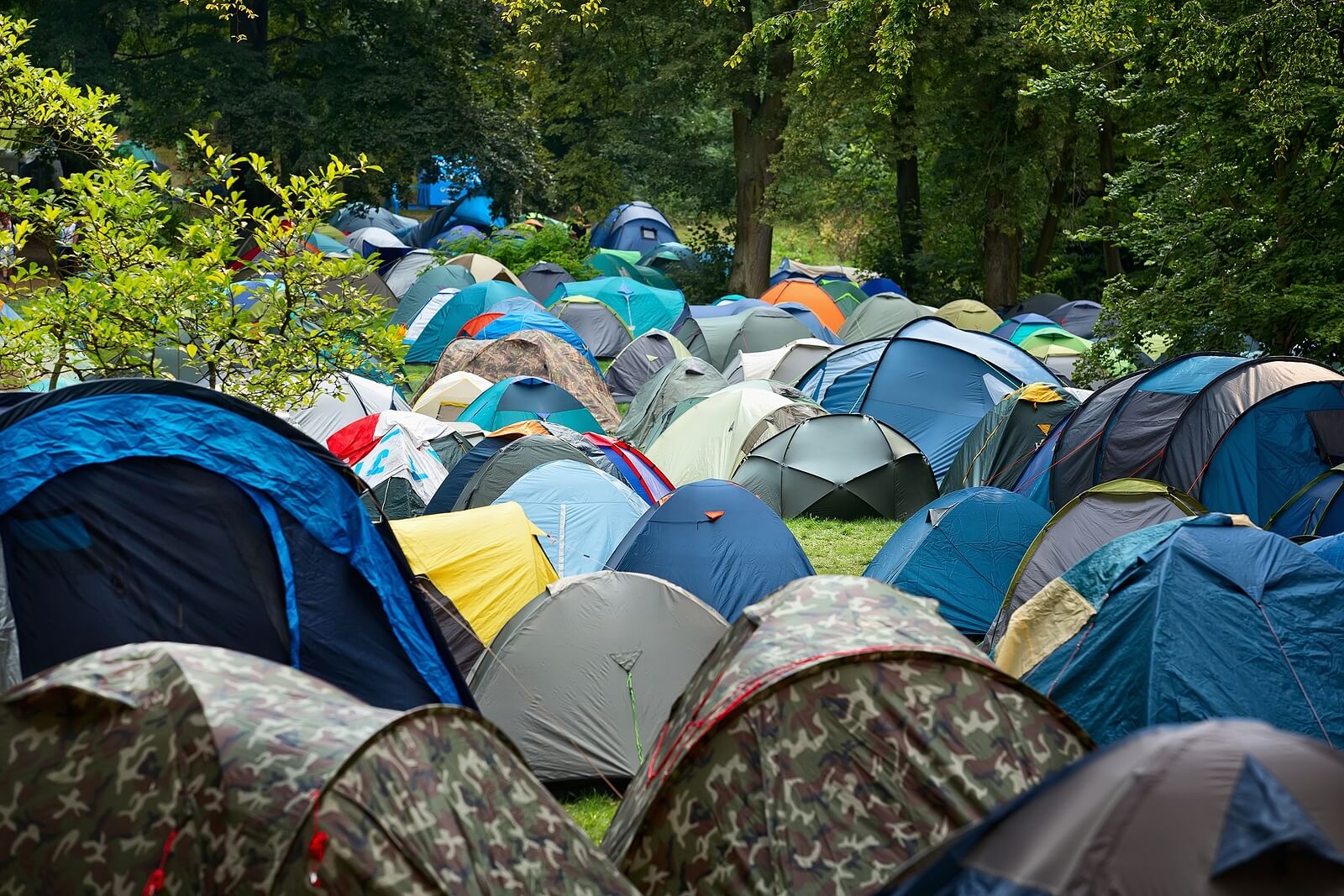The vibrant atmosphere and lively entertainment of UK festivals draw in millions of attendees every year. Our local music festivals attract 6.5 million people, with many more attending festivals dedicated to food, dance, arts, and cultural events.
Despite the excitement surrounding each British festival, there’s a persistent issue: excessive waste.
Waste management poses a significant challenge for organisers, whether those covering the sprawling grounds of Leeds Festival or smaller sites like Slam Dunk, Live at Leeds, and North Leeds Food Festival.
Taking charge of site waste is crucial to festival organisation. We’ve all witnessed the disheartening post-event footage of those lacking a sufficient festival waste management plan — fields strewn with litter, abandoned tents, and chairs.
Powerful Thinking’s ‘The Show Must Go On’ report revealed UK camping music festivals produce 25,800 tonnes of waste yearly. Prevention is ideal but not always feasible, so prioritising reusability and fostering a responsible waste disposal culture among festivalgoers is essential.
Join us as we explore six tips for managing waste at festivals. Learn how to prepare ticketholders, liaise with waste management vendors, and produce a comprehensive event waste management plan.
Implementing these practical strategies can prevent issues, alleviate concerns, and pave the way for a cleaner, more eco-friendly festival experience.
1. Engage festivalgoers in waste reduction
Festival attendees are the biggest contributors to on-site waste, so they should be involved in creating a low-waste festival ethos.
Take inspiration from Glastonbury Festival and consider a green pledge for your event. It could encompass principles like treating the festival grounds and fellow festivalgoers with respect, using designated facilities correctly for waste disposal, and ensuring campsite tidiness.
Be transparent about any specific waste reduction policies at your event and share a list of prohibited items that increase waste. Additionally, contemplate setting up innovative waste reduction schemes, like cup return initiatives, to incentivise responsible waste management among attendees.
Stay informed about industry campaigns, like Decathlon’s ‘No Tent Left Behind’, and share these opportunities with your audience. By actively engaging ticketholders and providing them with the necessary tools and information, you can significantly minimise waste and build a more sustainable festival environment.
In the lead-up to the event, proactively communicate with attendees through email and social media platforms, providing them with practical tips for reducing waste. Encourage them to bring reusable cups, food containers, bags, and even ashtray pouches. Make sure to also suggest alternatives to single-use items, like packaging-free toiletries and a flannel instead of wet wipes.
Share engaging content, like the video below, to educate festivalgoers about the importance of waste reduction and responsible disposal practices:
2. Curate eco-conscious vendors
When selecting vendors for your festival, prioritise those committed to eco-friendly practices and waste reduction schemes, avoiding those who rely on polystyrene packaging or other non-recyclable materials.
If composting facilities are available, welcome vendors who use biodegradable packaging, which can be composted alongside food waste. When composting isn’t an option, ensure all food packaging is recyclable.
Acknowledging the inevitability of food waste at your festival, engage in thorough discussions with each caterer to explore strategies for waste minimisation. It’s vital to establish clear expectations regarding waste management responsibilities and determine whether vendors will manage their waste independently or participate in the broader festival waste management plan.
Be diligent in engaging with every caterer and vendor, ensuring alignment on waste management practices and emphasising the importance of their contribution to a sustainable festival environment.
By curating a lineup of eco-conscious vendors, you can significantly reduce the environmental impact of your event and set a positive example for ticketholders.
3. Handpick a waste management company with care
Selecting the right waste management company for your festival is imperative for ensuring effective waste reduction and recycling efforts.
Festivals pose unique challenges for waste management companies, as they often encounter high levels of contamination, leading to decreased recycling rates and increased complexity in operations. Consequently, some companies may hesitate to take on the task. Luckily, others will be eager to lend their expertise.
Accepting the cheapest quote is tempting, but you must prioritise quality over cost-saving measures. Choose a waste management company that places recycling and sustainability above quick and inexpensive solutions.
Before reaching out to potential waste management partners, clearly understand your festival’s waste streams, attendance figures, and on-site catering requirements — issue identical quote requests to each company, detailing these factors.
Creating a competitive atmosphere by inviting multiple bids through an invitation to tender process can help ensure you receive the best possible service.
During discussions with shortlisted companies, ask about the final destination of collected waste and whether the company can provide comprehensive waste data post-event.
Be aware that some companies may be reluctant to provide waste data or may only offer limited recycling options on-site, leading to a lack of data. Negotiating a timeframe for delivering waste data and making it a condition of final payment can incentivise compliance and accountability.
Waste data collection may seem excessive, but it holds invaluable insights for future event planning. Through analysing this data, you can identify areas for improvement and refine your waste management strategies for subsequent festivals, contributing to more sustainable and environmentally responsible future events.
4. Collaborate with your festival waste management team

Waste management has been a long-overlooked aspect of festival planning, resulting in numerous challenges and issues. In today’s landscape, it’s essential to integrate waste considerations into every stage of the festival planning process.
Start by crafting a comprehensive festival waste management plan that outlines vital details and strategies. This plan serves as a blueprint for collaboration between your team and your chosen waste management company. Schedule a meeting to discuss and finalise the plan, ensuring alignment on all aspects.
Site capacity and attendee breakdown
Provide detailed information on the festival site’s capacity and the anticipated number of ticketholders, staff, performers, and vendors. Understanding the scale of the event is crucial for effective waste management planning.
Vendor waste management
Specify which vendors will manage their waste and which will require bins provided by the festival. This clarity ensures seamless coordination.
Waste streams and ratios
Identify the various waste streams expected at the festival. These might include food waste (and compostables), paper, cardboard, glass, aluminium, plastic, general waste, and sanitary waste. Detail the anticipated ratios for each stream to inform waste management strategies.
Bin requirements
Determine the size, type, and number of bins needed throughout the festival grounds. Consider factors like allocated bin colours and prominent labelling to enhance recycling efforts and minimise contamination.
Bin placement and collection schedule
Ascertain optimal locations for bins across the site, including backstage areas and vendor zones, to maximise accessibility and recycling efficiency. Establish a schedule for bin emptying and waste removal from the site to minimise disruption.
Logistics and contingency plans
Specify when bins should be delivered to the site and when they’ll be removed post-event. Designate storage areas for waste on-site, ensuring they are secure and accessible. Discuss using larger waste containers to consolidate waste from smaller bins and reduce collection frequency. Develop a contingency plan to address unforeseen challenges, like delays in bin emptying.
Collaborate closely with your festival waste management company and provide detailed guidance through a comprehensive plan. This will ensure you optimise waste management processes, minimise environmental impact, and ensure a seamless festival experience for all stakeholders.
5. Establish an on-site waste management team
Despite best intentions, littering is inevitable at festivals, so proactive planning is crucial.
You must establish an in-house waste management team that maintains cleanliness throughout the event.
This team will work with your waste management company to maintain bins and promptly pick up litter, ensuring it’s disposed of properly. Bin maintenance will enhance the site’s aesthetics and prevent litter from spreading.
To staff this team, consider recruiting volunteers willing to contribute their time in exchange for a complimentary ticket to the event.
Organise volunteers into shifts to ensure continuous coverage throughout the festival’s duration. These dedicated individuals will play a vital role in preserving the cleanliness and sustainability of the festival grounds, creating a more enjoyable experience for attendees while minimising environmental impact.
6. Strategise for post-event waste management

Even with the most comprehensive festival waste management plan, post-event cleanup remains a crucial and unavoidable aspect of running a festival.
Prepare your dedicated on-site waste management team to efficiently sort, remove, and process the waste left behind once the festival ends.
Camping areas often bear the brunt of post-event litter, with discarded tents a significant concern. According to the Association of Independent Festivals (AIF), an alarming 250,000 tents are abandoned at UK music festivals annually.
Take pre-emptive steps to address this issue by implementing initiatives to redirect abandoned tents to those needing shelter, promoting sustainability and social responsibility.
In addition to tents, the post-event cleanup entails sorting through various items like sleeping bags, clothing, and consumer waste. Take a systematic approach to ensure thorough removal and proper disposal of all waste materials.
When addressing surplus food from catering vendors, explore opportunities to redirect it to local charities or food banks. This minimises waste and supports communities in need, fostering a positive impact beyond the festival grounds.
By strategically planning for post-event waste management, you can mitigate environmental impact, promote social responsibility, and leave a lasting positive impression on ticketholders and the surrounding community.
